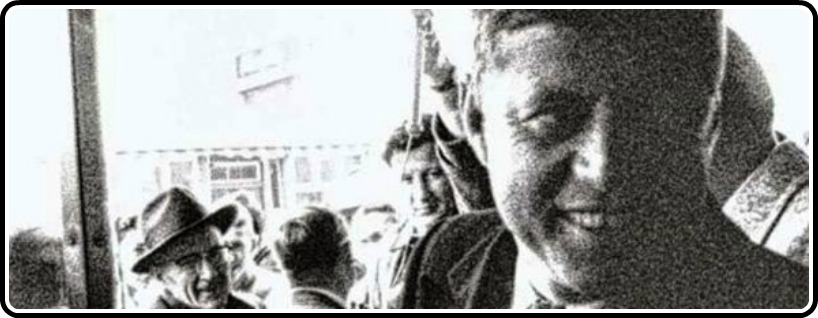There are moments in history, and then there are moments that define history, define generations.
50 years ago this past Friday, November 22, 1963, was one of those days. On a fall day in Dallas, Texas, then President of these United States, John F. Kennedy, was gunned down and killed in a case that still puzzles millions, and has inspired about as many conspiracy theories. Defining an entire generation (and as many pieces written on this anniversary will note, an entire medium in the form of television), his death is as large a touchstone moment as this nation had seen before, and has seen since.
And what made it all the more potent was the hope, the inspiration that JFK had inspired for the generation that his death so deeply affected. Known by most as the first “television President,” his Presidency was marked by a sense of drive and optimism that we haven’t quite seen in the political realm since. And yet, few attempt to point out how influential a time period in cinema his Presidency coincided with, particularly in the realm of documentary cinema.
One of the more influential documentaries of this time period, Primary, is of particular note. From director and former Life Magazine editor Robert Drew, the film is a breathtaking, and groundbreaking, early film from the movement he became an icon in, cinema verite. After creating a new system for photographers to take the candid and intimate aesthetic found within the pages of Life Magazine and give life to them via film, he took to the 1960 Wisconsin primary, which saw Kennedy taking on fellow Democratic hopeful Hubert Humphrey. A deeply powerful documentary film, this picture is not only a testament to a movement that would go on to be as influential as anything from the time period, but also a melancholy look at the vitality and hope found within this generation, a generation shattered by its presidential manifestation’s death.
Much like a film like People On Sunday, much of the non-aesthetic based intrigue from this film is entirely melancholy, a melancholy instilled within the film by existential, historical means. Watching the film today, especially when it recently aired as part of TCM’s honoring of JFK’s death, the film is utterly engrossing. The hope and optimism found within the two men the picture focuses on is distinctly esoteric to the time period, particularly when looking today, where we live within as bleak a political environment as this nation has ever seen.
Aesthetically, the film is bewildering. As intimate a documentary as you’re likely to see, the film very much seems influenced by Drew’s work at Life, and carries with it a fly on the wall style that is as definitive of the cinema verite movement as there is. From a scene near the beginning of the film (the introduction of JFK in the middle of a crowd as he walks up to a stage), Primary launches us directly into the middle of this ultimately historic primary, with unprecedented access to both men involved. From speech writing sessions to meet and greets, the film is a definitive look into a generation’s political machine, and just how different it is today.
Very much an influence on other political documentaries, films like The War Room especially (given that that film marks the closest this nation has gotten to the ‘60s sense of hope), Primary is more than deserving of a place among The Criterion Collection, not just because of its groundbreaking cinematic influence, but as a true historical touchstone. The film could use a new restoration, obviously, although the source material’s graininess does add even more immediacy to the film, and with Robert Drew sparking a close relationship to JFK, there are a trio of films that could be included on this release. Along with this film, two pictures followed, including Crisis: Behind A Presidential Commitment, and the most powerful picture, Faces Of November. Crisis takes a look at JFK’s handling of segregation during his Presidency, and, in the wake of his death, Faces touches on the nation, mourning their fallen leader. All three here make for as breathtaking a “trilogy” as you’ll find in the documentary world, and along with some interesting interviews, retrospective discussions and various other supplements, could make for one hell of a Criterion Collection box set. Here’s to hoping that we’ll one day see the release these three films so rightly deserve.




![Bergman Island (The Criterion Collection) [Blu-ray]](https://criterioncast.com/wp-content/uploads/2022/11/bergman-island-the-criterion-collection-blu-ray-400x496.jpg)
![This Is Not a Burial, It’s a Resurrection (The Criterion Collection) [Blu-ray]](https://criterioncast.com/wp-content/uploads/2022/11/this-is-not-a-burial-its-a-resurrection-the-criterion-collection-blu-ray-400x496.jpg)
![Lars von Trier's Europe Trilogy (The Criterion Collection) [The Element of Crime/Epidemic/Europa] [Blu-ray]](https://criterioncast.com/wp-content/uploads/2022/11/lars-von-triers-europe-trilogy-the-criterion-collection-the-element-of-400x496.jpg)
![Imitation of Life (The Criterion Collection) [Blu-ray]](https://criterioncast.com/wp-content/uploads/2022/11/imitation-of-life-the-criterion-collection-blu-ray-400x496.jpg)
![The Adventures of Baron Munchausen (The Criterion Collection) [4K UHD]](https://criterioncast.com/wp-content/uploads/2022/11/the-adventures-of-baron-munchausen-the-criterion-collection-4k-uhd-400x496.jpg)
![Cooley High [Criterion Collection] [Blu-ray] [1975]](https://criterioncast.com/wp-content/uploads/2022/11/cooley-high-criterion-collection-blu-ray-1975-400x496.jpg)